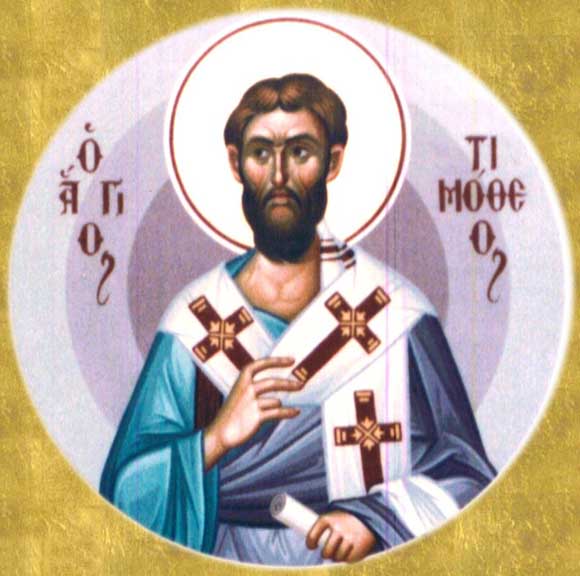 Timothy, a Greek name meaning “worshipper of God” or “one who honors God.” He was born to a pagan father and a Jewish mother named Eunice (Acts 16:1; 2 Timothy 1:5), and had a grandmother named Lois. His mother and grandmother, as the apostle Paul testifies, had a sincere faith from which Timothy inherited (2 Timothy 1:5). He knew the Scriptures from childhood (2 Timothy 3:15), but he did not join the Jewish religion, as evidenced by the fact that he was not circumcised (Acts 16:1-3) except at the apostle Paul’s instigation for Christian necessities.
Timothy, a Greek name meaning “worshipper of God” or “one who honors God.” He was born to a pagan father and a Jewish mother named Eunice (Acts 16:1; 2 Timothy 1:5), and had a grandmother named Lois. His mother and grandmother, as the apostle Paul testifies, had a sincere faith from which Timothy inherited (2 Timothy 1:5). He knew the Scriptures from childhood (2 Timothy 3:15), but he did not join the Jewish religion, as evidenced by the fact that he was not circumcised (Acts 16:1-3) except at the apostle Paul’s instigation for Christian necessities.
His mother and grandmother believed after Paul came to Derbe and Lystra during his first missionary journey. It was from them that Timothy believed in the Lord Jesus Christ. When Paul returned to Derbe and Lystra, he heard good testimony from the brothers about him. Since he needed a companion to help him in his travels and preaching, he took Timothy with him, because of his activity.
Timothy traveled with the Apostle Paul in Phrygia, Galatia, Thessalonica, Beroea, Athens, and elsewhere, and followed him to Caesarea in Palestine and to Rome. He was his personal envoy to several places such as Thessalonica, Corinth, Philippi, and Ephesus. Timothy played an active role in all these trips. Paul said of him to the Corinthians that he was “working the work of the Lord” (1 Corinthians 16:10-11), and to the Thessalonians that he was “our fellow worker in the gospel of Christ.” He also played a role in establishing the preaching (1 Thessalonians 3:2-3).
In everything Timothy showed complete faithfulness to the Apostle Paul. That is why the Apostle said of him that he is faithful in the Lord and teaches as he himself teaches in every place and in every church (1 Cor. 4:17). The Apostle Paul had no one on whom he could fully rely except Timothy. In some cases he considered him a copy of himself. He told the Philippians that he had no one like himself who cared for their affairs with sincerity (Philippians 2:19-22).
Paul was keen to provide his disciple with all the commandments, advice and support he saw him needing. Timothy was a young man exposed to all kinds of youthful lusts and whims. So he urged him to flee from lusts and foolish arguments because they generate strife (2 Timothy 2:22-23). He called on him to be sober in all things (2 Timothy 4:5), to turn away from vain and profane talk (1 Timothy 6:20), to treat the elders as fathers, the younger as brothers, the older women as mothers, and the younger women as sisters, with all purity (1 Timothy 5:1-2), and to avoid the love of money, which is the root of all evil and pierces the soul with many sorrows (1 Timothy 6:10-11). He also called him to be a role model for the believers in speech, behavior, love, spirit, faith, and purity, and to devote himself to reading, preaching, observing himself, and teaching (4:12-16). He urged the believers to embrace him, honor him, and cooperate with him (1 Corinthians 16:10-11).
It appears from the words of the Apostle Paul that his disciple was imprisoned and then released. This happened in Italy. The Apostle Paul wrote two letters to Timothy. In the first, he dealt with some of the difficulties that his disciple faced and explained the characteristics and duties of church teachers and ministers of the Gospel. In the second, he encouraged his disciple and urged him to persevere in the gospel and hold fast to the trust, knowing from whom he received it (3:14), and to share in hardships as a good soldier of Jesus Christ (2 Timothy 3:1-3).
It is mentioned in the heritage that Timothy met Saint John the Beloved in Ephesus and received blessings and grace from him. When John was exiled, Timothy governed the church in Ephesus in the spirit of Paul and John together. One day, while the pagans were celebrating one of their feasts, Timothy tried to turn them back from their error, but they rebelled against him and beat him severely. Some of his disciples came and dragged him away from them half dead, but he soon fell asleep after that. He was buried in the city of Ephesus near the shrine of Saint John the Beloved. Around the year 356 AD, his remains were transferred to Constantinople and deposited in the Church of the Holy Apostles. They remained there until the Crusaders stole them after the sack of Constantinople in the year 1204 AD.
The Holy Church celebrates his feast on January 22.
Troparia in the fourth tune
When you learned good things, and were awakened in all circumstances, wearing good intentions as befits the priesthood, you learned from the chosen vessel the indescribable mysteries, and since you kept the faith, you completed the right course, O Apostle Timothy, so intercede with Christ God to save our souls.
Kontakion in the first tone (on the same day is the feast of the holy martyr Anastasius the Persian)
O believers, let us today praise with hymns Timothy, the divine disciple, who accompanied Paul on his journeys, honoring with him the wise Anastasius, who shone from Persia like a star, removing the passions of our souls and the diseases of our bodies.


